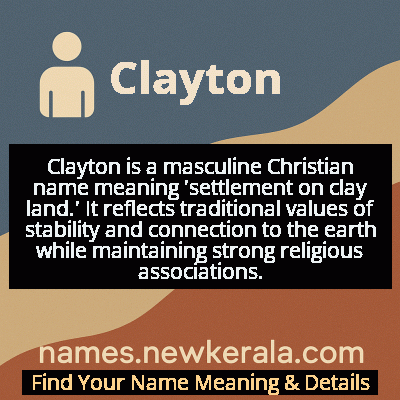Clayton Name Meaning & Details
Origin, Popularity, Numerology Analysis & Name Meaning of Clayton
Discover the origin, meaning, and cultural significance of the name CLAYTON. Delve into its historical roots and explore the lasting impact it has had on communities and traditions.
Name
Clayton
Gender
Male
Origin
Christian
Lucky Number
9
Meaning of the Name - Clayton
Clayton is a masculine Christian name meaning 'settlement on clay land.' It reflects traditional values of stability and connection to the earth while maintaining strong religious associations.
Clayton - Complete Numerology Analysis
Your Numerology Number
Based on Pythagorean Numerology System
Ruling Planet
Mars
Positive Nature
Generous, passionate, energetic, and humanitarian.
Negative Traits
Impulsive, impatient, moody, and can be overly emotional.
Lucky Colours
Red, maroon, scarlet.
Lucky Days
Tuesday.
Lucky Stones
Red coral, garnet.
Harmony Numbers
1, 2, 3, 6.
Best Suited Professions
Military, sports, philanthropy, leadership roles.
What People Like About You
Courage, energy, leadership, generosity.
Famous People Named Clayton
Clayton Kershaw
Professional Baseball Player
Three-time Cy Young Award winner and World Series champion
Clayton Moore
Actor
Iconic portrayal of The Lone Ranger in television and film
Clayton Christensen
Business Scholar
Developed disruptive innovation theory and authored influential business books
Clayton Bigsby
Fictional Satirical Character
Memorable character from Chappelle's Show exploring racial identity
Name Variations & International Equivalents
Click on blue names to explore their detailed meanings. Gray names with will be available soon.
Cultural & Historical Significance
Extended Personality Analysis
The name Clayton typically evokes images of someone who is dependable, practical, and deeply grounded. These individuals often exhibit a calm, steady demeanor that others find reassuring in times of stress or uncertainty. Their connection to the name's earthy origins manifests in a preference for tangible results and hands-on approaches to problem-solving. Claytons are frequently perceived as builders—whether of relationships, careers, or communities—approaching each project with careful planning and persistence. They tend to value honesty and direct communication, often serving as the moral compass in their social circles. While not necessarily flashy or attention-seeking, Claytons often possess quiet leadership qualities that emerge when their expertise or judgment is needed. Their strength lies in consistency and reliability, making them pillars in their families and workplaces. The name suggests someone who, like clay, can adapt to circumstances while maintaining their essential character, able to be shaped by experience without losing their fundamental integrity. This adaptability combined with core stability makes Claytons particularly effective in roles requiring both flexibility and steadfastness.
Modern Usage & Popularity
In contemporary naming practices, Clayton maintains a position as a respected classic that bridges traditional and modern sensibilities. While its popularity peaked in the 1990s when it ranked around #100 in the United States, it has gradually declined to the 300-400 range in recent years, making it familiar yet distinctive. The name appeals to parents seeking a strong, masculine name with historical roots that doesn't feel dated or overly common. Its versatility allows it to work across socioeconomic and regional boundaries, equally at home in urban professional settings and rural communities. The availability of the friendly nickname 'Clay' adds to its modern appeal, providing options for different life stages and contexts. Current usage trends show Clayton being chosen by parents who value names with clear meanings and substantial feel, often as an alternative to more popular traditional names like William or James. Its steady, though not explosive, popularity ensures it remains recognizable without becoming trendy or overused.
Symbolic & Spiritual Meanings
Symbolically, Clayton embodies the profound metaphor of human potential and transformation inherent in clay as a material. Just as clay can be molded into countless forms—from simple pottery to architectural marvels—the name suggests limitless potential shaped by intention and effort. It represents the fundamental connection between humanity and the earth, echoing biblical creation narratives where God forms humans from clay or dust. The name carries connotations of humility and substance, reminding us that great things often emerge from humble origins. In its symbolic dimension, Clayton also represents endurance and legacy, as clay artifacts survive for millennia, speaking to the human desire to create something lasting. The process of firing clay—transforming soft earth into durable ceramic—parallels personal growth through life's challenges. This name symbolizes the beautiful tension between flexibility and firmness, suggesting that true strength combines adaptability with core principles. In Christian symbolism, it connects to themes of being vessels in God's hands, shaped for purpose and service.

